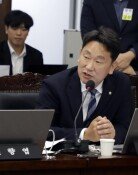Evaluating the Fourth Anniversary of South-North Joint Declaration
Evaluating the Fourth Anniversary of South-North Joint Declaration
Posted June. 14, 2004 22:56,
With the fourth anniversary of the June 15th South-North Joint Declaration approaching, scholars and experts of the four powers affecting the Korean Peninsula the U.S., Japan, China, and Russia have evaluated the South-North summit meeting as a good cornerstone for peace in the Korean Peninsula. They also pointed out, however, that in order to revitalize the Joint Declaration, the current North Korean nuclear crisis should be peacefully resolved.
Results of the June 15 South-North Joint Declaration
Former U.S. Department of State, North Korean Affairs officer Kenneth Quinones attributed a significance to the meeting saying, The four years after the South-North summit meeting changed South and North Korean relations more than in the previous 40 years.
Japanese experts on the Korean Peninsula point out that, after the summit meeting, the acute confrontation that lasted for decades between South and North Korea finally began to change into cooperative relations, reducing the tensions in the peninsula. Professor Okonogi Masao of Keio University appraised, After the summit meeting, the South-North relationship steadily improved, centered on issues agreed on by both sides during the meeting.
Chinese and Russian academics also agree that the Joint Declaration is one of the most important driving forces that catalyzed interchange in the economic, social, media and other areas. Valery Denisov, former Russian ambassador to North Korea and currently a professor at the Russian International Relations University, said, The summit meeting has the historical significance of radically changing the overall South-North relations.
Tasks to Be Done to Improve South-North Relations
All of the expert point out, however, that the solution of the current North Korean nuclear crisis is the greatest challenge.
Former North Korean Affairs officer Quinones analyzed that, North Koreas nuclear crisis is the biggest threat hindering the Korean Peninsulas road to peace.
Professor Hiraiwa Onji of the Shizuoka University, Japan indicated, The three countries South Korea, the U.S., and Japan - agreed to jointly deal with the problem, but South Korea seems to be sensitive toward North Korea, hence the principle of using both dialogue and pressure was not effective. He added, Interchange between South and North Korea is important, but in the long term, it is more desirable that both sides speak their minds and maintain an equal relationship. There was also advice that the current anti-American sentiment in Korea did not help improve the South-North relation. South Korea should not turn its neighbors into enemies, said Alexander Vorontsov, chief of the Korean Department at the Institute of Oriental Studies of the Russian Academy of Sciences, adding, Even to preserve peace and stability in the Korean Peninsula, South Korea should keep good relations with the U.S. and other neighbors.
Professor Okonogi commented, As one can see in the example of Germany, unification requires the cooperation of neighboring countries.
Soon-Taek Kwon Won-Jae Park maypole@donga.com parkwj@donga.com







